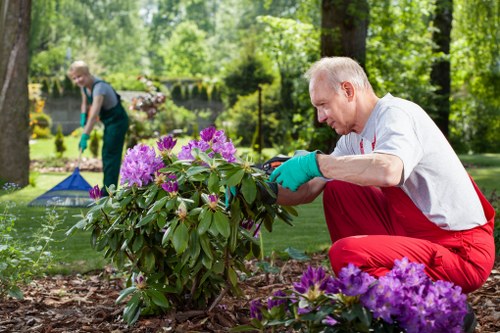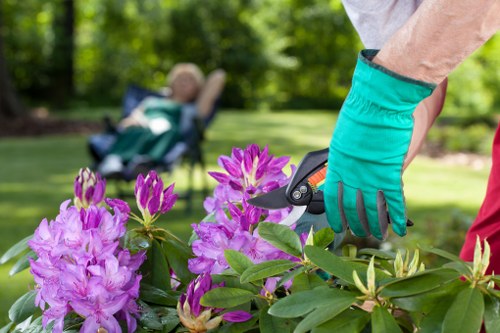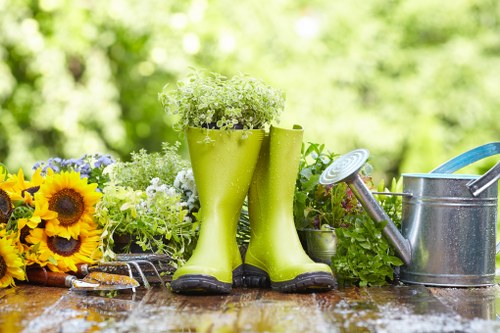Comprehensive Guide to Garden Maintenance in Muswell Hill
Introduction to Garden Maintenance

Maintaining a beautiful garden in Muswell Hill requires dedication, knowledge, and the right techniques. Whether you're a seasoned gardener or a beginner, understanding the local climate and soil conditions is crucial for a thriving garden.
Muswell Hill offers a unique set of challenges and opportunities for garden enthusiasts. With its temperate climate and diverse plant life, gardeners can enjoy a variety of flowers, shrubs, and trees throughout the year.
In this guide, we'll explore essential tips and strategies to keep your garden in Muswell Hill looking its best, ensuring it remains a vibrant and inviting space.
Understanding Muswell Hill’s Climate

The climate in Muswell Hill is characterized by mild winters and warm summers, providing an ideal environment for a wide range of plants. However, seasonal changes can impact garden maintenance routines.
During the spring, gardeners should focus on soil preparation and planting seasonal blooms. Summer requires diligent watering and pest control, while autumn involves leaf management and preparing plants for the colder months.
Winter gardening in Muswell Hill may seem daunting, but with the right strategies, you can protect your plants and maintain garden health throughout the year.
Soil Preparation and Maintenance

Healthy soil is the foundation of a flourishing garden. In Muswell Hill, the soil composition can vary, so it's essential to test your soil and amend it as necessary.
Add organic matter such as compost or well-rotted manure to improve soil structure and fertility. Regularly turning the soil helps aerate it, promoting root growth and nutrient absorption.
Mulching is another crucial practice. It retains moisture, suppresses weeds, and regulates soil temperature, creating an optimal environment for your plants.
Plant Selection and Care

Choosing the right plants for your Muswell Hill garden is vital. Opt for species that are well-suited to the local climate and soil conditions.
Perennials, annuals, and shrubs each have their own maintenance needs. Understanding these requirements will help you provide the appropriate care, ensuring healthy and vibrant growth.
Regular pruning and deadheading encourage plant health and prolong blooming periods. Additionally, incorporating native plants can attract beneficial wildlife and enhance your garden's ecosystem.
Watering Techniques

Proper watering is essential for garden maintenance in Muswell Hill. Overwatering can lead to root rot, while underwatering can stress plants and inhibit growth.
Implementing an efficient watering system, such as drip irrigation or soaker hoses, ensures that plants receive consistent moisture without wastage.
Timing is also crucial. Watering early in the morning reduces evaporation and allows plants to absorb moisture before the heat of the day.
Pest and Disease Management
Protecting your garden from pests and diseases is a key aspect of maintenance. Regular inspections help identify issues early, making them easier to manage.
Use organic or chemical treatments as needed, and consider natural pest control methods like introducing beneficial insects.
Maintaining garden hygiene by removing dead plant material and debris reduces the risk of disease spread.
Seasonal Garden Tasks
Each season brings specific tasks that are essential for maintaining a healthy garden in Muswell Hill.
- Spring: Soil preparation, planting, and pruning.
- Summer: Watering, weeding, and pest control.
- Autumn: Leaf removal, composting, and planting bulbs.
- Winter: Protecting plants, pruning dormant growth, and planning for the next season.
Adhering to a seasonal maintenance schedule ensures that your garden remains in optimal condition year-round.
Tools and Equipment
Having the right tools is essential for effective garden maintenance in Muswell Hill. Invest in quality equipment that suits your gardening needs.
- Pruners and shears for trimming and shaping plants.
- Shovels and spades for soil preparation and planting.
- Garden hoses and watering cans for efficient watering.
- Mulching tools to apply and manage mulch layers.
Regularly maintaining your tools will extend their lifespan and ensure they perform effectively.
Landscape Design Tips
Designing your garden layout enhances both aesthetic appeal and functionality. Consider elements such as plant arrangement, color schemes, and structural features.
Incorporate pathways, seating areas, and focal points to create a harmonious and inviting space.
Balancing diverse plant types and heights adds depth and visual interest to your garden design.
Sustainable Gardening Practices
Adopting sustainable practices contributes to a healthier environment and a more resilient garden.
Use organic fertilizers and pest control methods to minimize chemical usage. Implement rainwater harvesting to conserve water and reduce reliance on municipal sources.
Promote biodiversity by planting native species and creating habitats for beneficial insects and wildlife.
Professional Garden Maintenance Services
For those who prefer expert assistance, professional garden maintenance services in Muswell Hill offer comprehensive care.
These services include regular upkeep, specialized treatments, and personalized garden design consultations.
Hiring professionals ensures that your garden receives consistent and high-quality maintenance, allowing you to enjoy a beautiful outdoor space with minimal effort.
DIY Garden Maintenance Tips
If you enjoy taking a hands-on approach, here are some DIY tips to maintain your garden in Muswell Hill:
- Create a maintenance schedule to keep track of tasks.
- Use natural fertilizers to enrich the soil.
- Implement companion planting to deter pests.
- Regularly prune and trim plants to encourage healthy growth.
These practices help you manage your garden efficiently and effectively.
Enhancing Garden Aesthetics
Enhancing the visual appeal of your garden involves attention to detail and creative planning.
Incorporate diverse plant textures, colors, and heights to create a dynamic and engaging space.
Adding decorative elements such as garden art, sculptures, and water features can elevate the overall aesthetic of your garden.
Maintaining Garden Health
Maintaining the health of your garden is an ongoing process that requires vigilance and care.
Regularly monitor plant health, address any issues promptly, and ensure that plants receive the necessary nutrients and water.
Healthy gardens are more resilient to pests, diseases, and environmental stresses.
Conclusion
Effective garden maintenance in Muswell Hill combines knowledge, proper techniques, and consistent effort. By understanding the local climate, preparing the soil, selecting suitable plants, and implementing sustainable practices, you can create and maintain a thriving garden.
Whether you choose to manage your garden yourself or enlist professional services, the key is to stay informed and proactive in your maintenance efforts.
Contact us today to discover how we can help you achieve the garden of your dreams in Muswell Hill.

